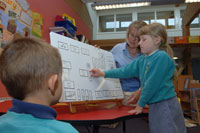|
|
|
|
|
|
|
|
|
How is POPAT different?
POPAT teaches the segmentation of words into single sounds directly without using letters and without the need for such exercises as chunking or rhyming.
 Early in POPAT,letters are attached to the consonant sounds, then to the short vowels. These are quickly and easily learnt, encouraging learners to use them much sooner in their free writing. Early in POPAT,letters are attached to the consonant sounds, then to the short vowels. These are quickly and easily learnt, encouraging learners to use them much sooner in their free writing.
In traditional phonics, letters and letter clusters are learnt over an extended period so that children can take much longer to become independent writers.
POPAT is not dedicated to a particular language. It teaches the psycholinguistic skills all human beings need to become literate. It can therefore be adapted for use in any language.
Traditional phonics is language specific.

POPAT develops the mental processes that people need to write words from their own vocabulary and to read unfamiliar words. It is bottom up.
Traditional phonics seeks to impart a body of knowledge about letters, letter clusters and spelling families. It is top down.
POPAT encourages learners to discover which letters and letter clusters are used to spell speech sounds in English and the frequency of a particular spelling, giving the writer the power of choice.
Traditional spelling programmes teach and test a bank of random words which often fail to generalize into usage.
Back to top
|
|
|
|
|